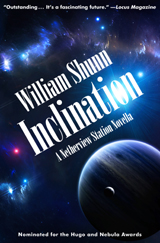W
wait
ward
Wendy's Hamburger Restaurants
For those of you who live in Outer Ghombu, Wendy's is a chain of fast-food
restaurants that serve "old-fashioned hamburgers." There is no actual
character named Wendy in my narrative.
White Bible
Slang for the Missionary Handbook, a pocket-sized rulebook for
missionaries with a pure white cover.
whites
Mission slang for proselytizing clothes -- i.e., suit and tie.
Why the term "whites" when missionaries' suits are supposed to be dark and conservative? It's a mystery to me.
Why the term "whites" when missionaries' suits are supposed to be dark and conservative? It's a mystery to me.
Word of Wisdom, the
Common name for the dietary commandments contained in the eighty-ninth
section of the Doctrine and Covenants. Loosely interpreted,
these verses form the basis for the Mormon proscriptions
against coffee, tea, alcohol and tobacco.
In point of fact, neither coffee nor tea is mentioned anywhere in these verses. Their proscription is based on the following passage: "And again, hot drinks are not for the body or belly" (D & C 89:9). Church leaders have interpreted this verse to mean coffee and tea -- though why other "hot drinks" like cocoa and hot cider and Postum are not included in this dictum is a mystery to me. (You can hardly attend a wintertime Church activity without having a styrofoam cup of hot cocoa shoved into your mitts.)
Many Church members are convinced that caffeine is the evil ingredient that has earned coffee and tea their untouchable status. For this reason, these same members remain convinced that people who drink Coke and Pepsi are going to hell. Of course, these are often the same folks who consume chocolate by the magnum. Go figure.
On the other hand, this notion allows many Mormons to justify the consumption of decaf coffees and herbal teas.
The term is also used as an adjectivial phrase, often to point out other people's "substance-abuse" difficulties; e.g., "I'd suggest Brother Zappa as the new Scoutmaster, but he has such a Word of Wisdom problem. Why, just the other day I saw him ordering that coffee-flavored ice cream at the Baskin-Robbins."
In point of fact, neither coffee nor tea is mentioned anywhere in these verses. Their proscription is based on the following passage: "And again, hot drinks are not for the body or belly" (D & C 89:9). Church leaders have interpreted this verse to mean coffee and tea -- though why other "hot drinks" like cocoa and hot cider and Postum are not included in this dictum is a mystery to me. (You can hardly attend a wintertime Church activity without having a styrofoam cup of hot cocoa shoved into your mitts.)
Many Church members are convinced that caffeine is the evil ingredient that has earned coffee and tea their untouchable status. For this reason, these same members remain convinced that people who drink Coke and Pepsi are going to hell. Of course, these are often the same folks who consume chocolate by the magnum. Go figure.
On the other hand, this notion allows many Mormons to justify the consumption of decaf coffees and herbal teas.
The term is also used as an adjectivial phrase, often to point out other people's "substance-abuse" difficulties; e.g., "I'd suggest Brother Zappa as the new Scoutmaster, but he has such a Word of Wisdom problem. Why, just the other day I saw him ordering that coffee-flavored ice cream at the Baskin-Robbins."


